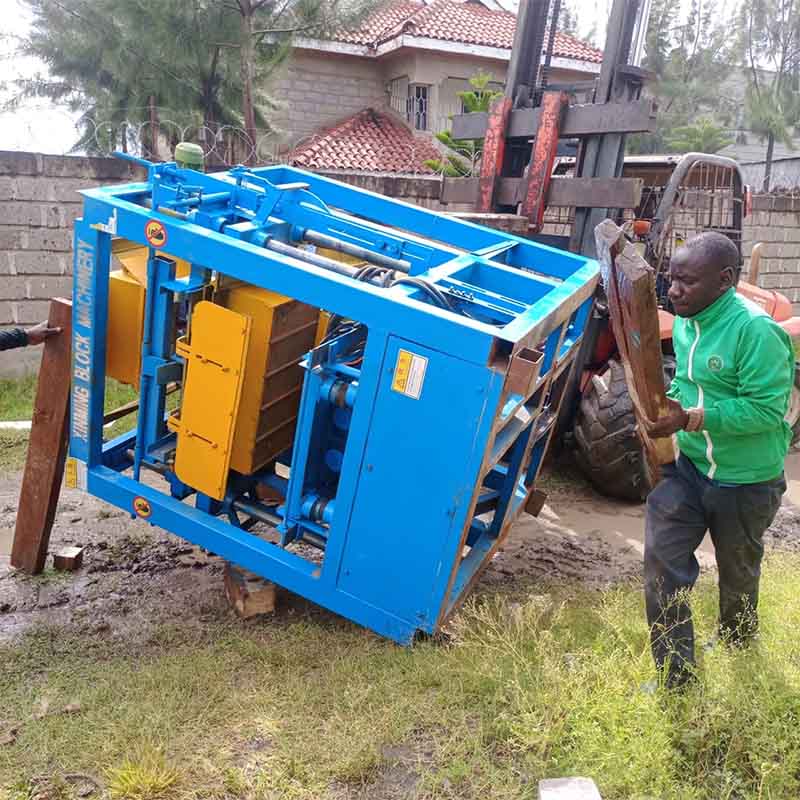
Image source Aiweibrickmachine
Nurturing Expertise: Training and Skill Development for Semi-Automatic Block Machine Operators
In the realm of construction, where precision and efficiency are paramount, the role of semi-automatic block machine operators cannot be overstated. These skilled individuals are responsible for the operation and maintenance of semi-automatic block production equipment, ensuring the quality and quantity of concrete blocks produced. However, their expertise is not innate but acquired through structured training and skill development programs. This exploration delves into the critical importance of training and skill development for semi-automatic block machine operators, shedding light on the curriculum, methodologies, and the broader implications for the construction industry.
Section 1: The Significance of Skilled Operators
1.1 The Backbone of Block Production
Semi-automatic block machine operators form the backbone of block production facilities. Their proficiency directly impacts production efficiency, block quality, and overall operational success.
1.2 The Changing Landscape
As semi-automatic block production technology evolves, the role of operators is becoming more complex, necessitating a deeper understanding of equipment, materials, and digital tools.
Section 2: The Training Curriculum
2.1 Fundamental Knowledge
Operators begin their training by acquiring a foundational understanding of concrete block production processes, including raw material composition, mixing techniques, and mold design.
2.2 Machine Operation
A significant portion of training focuses on machine operation, covering topics such as machine setup, control panel navigation, and troubleshooting common operational issues.
2.3 Safety Protocols
Ensuring the safety of both operators and equipment is paramount. Training includes safety protocols, emergency procedures, and the proper use of personal protective equipment (PPE).
2.4 Quality Control
Operators are trained in quality control measures, including visual inspection, block testing, and adherence to industry standards and specifications.
2.5 Maintenance Skills
Basic maintenance skills are imparted to operators, enabling them to perform routine maintenance tasks, replace worn parts, and ensure the longevity of equipment.
2.6 Digital Tool Integration
As digital tools become integral to semi-automatic block production, operators receive training in the use of IoT sensors, data analytics, and machine learning algorithms to monitor and optimize processes.
Section 3: Training Methodologies
3.1 Hands-On Training
Practical, hands-on training is a fundamental component of skill development for operators. This approach allows them to familiarize themselves with machine components, controls, and troubleshooting in a real-world setting.
3.2 Simulation and Virtual Reality
Advanced training methods leverage simulation and virtual reality technologies to create realistic training environments, allowing operators to practice and refine their skills without risk to equipment or personnel.
3.3 Classroom Instruction
Classroom sessions complement hands-on training by providing operators with theoretical knowledge, industry insights, and the scientific principles behind concrete block production.
3.4 On-the-Job Training
Operators often undergo on-the-job training, working under the guidance of experienced mentors to gain practical experience and learn from real-world challenges.
3.5 Continuous Learning
The construction industry is dynamic, and ongoing training is essential to keep operators updated on new technologies, best practices, and regulatory changes.
Section 4: Certification and Credentialing
4.1 Certification Programs
Certification programs, offered by industry organizations and vocational institutions, validate the skills and knowledge acquired by operators during their training.
4.2 Benefits of Certification
Certified operators are more likely to be hired by employers and may command higher salaries. Certification also enhances industry credibility and customer confidence in block production facilities.
4.3 Continuous Professional Development
Operators are encouraged to engage in continuous professional development, pursuing advanced certifications and staying informed about industry trends.
Section 5: Challenges and Solutions
5.1 Limited Access to Training
In some regions, access to quality training programs may be limited. Collaborations between industry associations, governments, and vocational institutions can help bridge this gap.
5.2 Language and Literacy Barriers
Operators with limited language skills or literacy may face challenges in accessing training materials. Multilingual training resources and audiovisual content can address these barriers.
5.3 Rapid Technological Changes
The pace of technological advancement in construction requires ongoing training and upskilling. Employers should invest in regular training updates for their operators.
Section 6: The Broader Implications
6.1 Enhanced Productivity
Skilled operators are more efficient in machine operation, leading to increased productivity and reduced production costs.
6.2 Quality Assurance
Operators trained in quality control techniques contribute to the production of high-quality blocks that meet industry standards and customer expectations.
6.3 Safety and Risk Mitigation
Properly trained operators are more adept at identifying and addressing safety hazards, reducing the risk of accidents and equipment damage.
6.4 Industry Reputation
A workforce of well-trained operators enhances the reputation of block production facilities, attracting customers and fostering long-term relationships.
Section 7: The Future of Operator Training
7.1 Technological Integration
Training will increasingly incorporate digital tools and virtual reality simulations to prepare operators for the evolving landscape of semi-automatic block production.
7.2 Sustainability Focus
Operators will receive training in sustainable practices, including eco-friendly materials and energy-efficient processes.
7.3 Accessible Training
Efforts will be made to make training more accessible, including online courses, multilingual resources, and partnerships with educational institutions.
Section 8: Conclusion
The training and skill development of semi-automatic block machine operators are foundational to the success of block production facilities and the construction industry as a whole. Well-trained operators are not just cogs in a machine; they are the stewards of quality, safety, and efficiency. As the construction industry continues to evolve, with digital tools and sustainability at the forefront, the role of operators becomes increasingly critical. By investing in structured training programs, embracing technological advancements, and fostering a culture of continuous learning, the construction industry can ensure that its operators are equipped to meet the challenges and opportunities of the future. In doing so, it paves the way for safer, more efficient, and sustainable construction practices that benefit all stakeholders.
